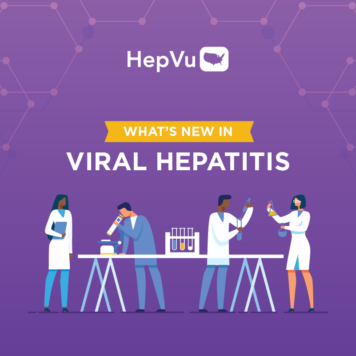Lauren Canary, MPH, is the Director of the National Viral Hepatitis Roundtable (NVHR).
Q: You have been working in the viral hepatitis space for the better part of a decade and became the director of NVHR last year. What is your vision for the organization?
I’m really lucky that NVHR is now a program under the Hepatitis Education Project, and the visionary leadership of Michael Ninburg. As someone who has lived experience with viral hepatitis and someone who prioritizes health equity, his values are reflected in NVHR’s direction and keeps the program on track. We are hoping to drive progress towards elimination while raising awareness of and taking action to address the massive disparities in who gets viral hepatitis, who gets treated, and who dies unnecessarily.
One thing that has been incredible about coming to NVHR is the opportunity to work with people who have lived with viral hepatitis, particularly the Hepatitis C patients and survivors who came together at a first-of-its-kind patient summit last year. After meeting with them and seeing how passionate they are about driving elimination, it has been a goal of mine to empower programs to ensure patients and survivors can be part of the process. In everything that we do, we should have people with this experience at the table; to shape policies, inform our public health response, and serve in formal advisory roles in elimination planning in their jurisdictions.
Finally, in terms of my vision personally, I’m hoping to call in more partners to our movement. One of the first things I noticed when I left the public health realm to work in hepatitis advocacy was our movement was small, albeit mighty. I think we can drive greater progress if we welcome partners to join our cause as we work toward elimination; such as those in cancer prevention, rural health, reproductive health, and substance use.
Q: CDC has recently broadened its testing recommendations for Hepatitis C to include all adults once in their life, with more frequent screening for individuals with specific risk behaviors and pregnant women during each pregnancy. What can be done to help providers follow these recommendations and to ensure patients are aware of this change?
I’ve been thinking about this a lot, especially regarding the ‘Baby Boomer’ recommendations that came out in 2012, which recommended universal screening for all adults born between 1945-1965. If we look at the trends following the announcement of those recommendations, we can see that there were challenges in getting providers to implement the recommendations. We need to learn from that experience and adjust the way that we launch an awareness campaign around these new recommendations. Our experience with the ‘Baby Boomer’ recommendations taught us that we cannot put all the responsibility on the shoulders of viral hepatitis programs alone; we need an all-hands-on-deck approach. We need buy-in from all of the federal agencies that deal with viral hepatitis in one way or another; that means not just CDC, but also HRSA, SAMHSA, and NIH.
Additionally, there needs to be strong buy-in and communication to providers from professional societies and medical associations. We have great partners in the American Association for the Study of Liver Diseases and the Infectious Diseases Society of America, but I think we could do more to engage some of the primary care associations like American Academy of Family Physicians, American Medical Association, as well as the Associations of Nurse Practitioners, Physicians’ Assistants, and Pharmacists. Now more than ever we also need strong buy-in from American College of Obstetricians and Gynecologists, Society of Maternal and Fetal Medicine, and American Academy of Pediatrics, especially with this new recommendation specifically impacting pregnant people. That recommendation will be huge in identifying people during pregnancy who may have Hepatitis C so that mothers can be treated for Hepatitis C after they deliver and babies can be followed over time and tested to determine whether they have Hepatitis C. I have met a few patient advocates who had Hepatitis C from birth and they’re very excited about this recommendation and the positive impact it will have on thousands of kids every year who won’t have to go through what they went through.
Finally, I think we need to engage the private sector in helping get the word out as well. I know a lot of people are aware of the ‘Baby Boomer’ recommendations because of industry, particularly due to the commercials they were airing, encouraging folks to get tested and treated. I do think we’re going to need support from private industry, not just limited to pharmaceutical companies, but also from commercial laboratories and electronic medical record (EMR) system manufacturers. Direct to consumer messaging will help us raise awareness in the public sphere, empowering people to ask their providers for a test.
Q: How has COVID-19 disrupted hepatitis screening and care across the U.S., and how are organizations adjusting to the circumstances?
Organizations that serve our community have been incredible. They’re showing a huge amount of resilience and commitment given the immense challenges. However, I think with COVID public health guidance, specifically around physical distancing, a lot of organizations are not doing testing or vaccinating right now. I think in some cases, it’s just that they simply don’t have the resources to be able to adapt their practices to do so safely.
Some providers are offering telehealth services, but that hasn’t been an easy transition for many and has posed some logistical challenges. For instance, internet and technology access among patients may be difficult especially for many populations at greater risk of infection. In addition, they may not have sufficient personal protective equipment, or they may not have resources to develop the needed protocols that would help them continue those processes in light of COVID or additional staff to ensure viral hepatitis services continue.
We are hearing from some patients who are having trouble getting access to treatment as well. Some providers aren’t taking new patients or have limited bandwidth due to COVID. And, plenty of patients still cannot access Hepatitis C medication due to illegal prior authorization criteria among some state Medicaid programs.
Q: Syringe Service Programs (SSPs) are not currently designated as essential services in many communities and are struggling to continue providing services to individuals in need during COVID-19. How do you see this impacting viral hepatitis in the U.S. in the coming year?
I am concerned, honestly. We have seen some states that have designated these programs as essential but do not designate the staff as essential. This means staff may not be getting the support that they need in terms of personal protective equipment (PPE) or financial resources to adapt their services. I am worried that they’re not going to be able to keep up the great work they’re doing. SSPs truly are the backbone of our public health response for people who use drugs. Anything that we do that sacrifices their ability to work is going to be problematic.
I worry that we will see increases in viral hepatitis as well as other consequences of unsafe substance use (e.g. HIV, overdose, endocarditis)—we have already seen increases in Hepatitis A in several jurisdictions where vaccination efforts among high-risk individuals have stopped. If folks don’t have access to safe equipment or to testing and treatment for Hepatitis B and C, we will most certainly see increases, unfortunately. This is why NVHR is calling on Congress and state health officials to support harm reduction programs amid the COVID response.
Q: What opportunities and lessons learned do you see for viral hepatitis surveillance arising out of the increased public health focus on contact tracing and testing around COVID-19?
I think, if there is a silver lining to this crisis, it’s that nationally everyone’s talking public health. There’s this newfound vocabulary in every household around this viral epidemic, testing, and contact tracing. So we all, very abruptly, have increased the interest on a national scale for talking about these things. I think that will be helpful as we appeal to the public and to lawmakers to care about investing in public health and addressing these other viral epidemics in our communities.
There has been such a focus in the U.S. on COVID testing capacity and people really appreciate that testing and surveillance are the cornerstones of our public health response. This recognition will allow us to draw parallels with viral hepatitis because testing and support for surveillance of viral hepatitis has been a struggle for a long time. Currently, CDC only has enough funding to support 14 jurisdictions to do enhanced surveillance. My hope is that this recognition will drive investment in our public health infrastructure, and in surveillance, in particular, to inform our projects.
Another silver lining is in regard to testing technology. We’ve seen rapid innovation in the realm of testing for COVID, specifically with the antibody and antigen tests. That kind of innovation could be central to our success with hepatitis elimination. The FDA is currently proposing a down-classification of Hepatitis C testing technologies. My hope is that we’ll be able to encourage companies who create some of those COVID-19 tests to pursue viral hepatitis rapid antigen tests that could be deployed for elimination strategies.
Q: As we navigate a post-COVID world, how do we ensure states and local jurisdictions continue to focus on Hepatitis and progress towards HCV elimination?
We need to be focusing on it now. We cannot wait for a post-COVID world to prioritize hepatitis elimination. I think if we focus solely on COVID and leave viral hepatitis on the back burner, it’s going to have a strong resurgence and we’ll be playing whack-a-mole with various viral infections. What we need to be doing is to be providing extra support to our public health agencies to address viral hepatitis at the same time as COVID.
This is especially important right now because we know that people with chronic liver disease are at greater risk of complications and death from COVID-19. So, it’s more important than ever for people to know their status, get treated if needed, and to be vaccinated against Hepatitis A and B. I think we need to give health departments as much support as they need to address these syndemics together.
Q: This month is Hepatitis Awareness Month, and Hepatitis Testing Day is on May 19. How is NVHR raising awareness of viral hepatitis and encouraging testing this year?
On Hepatitis Testing Day, NVHR is going to co-host a Twitter chat with CDC and other national partners, NASTAD and Hep B Foundation. We’re looking forward to the opportunity to engage with the community more broadly around specific topics related to hepatitis testing. We raise awareness all year long, but this month presents a window of opportunity to get additional coverage, especially around the intersection of viral hepatitis and COVID-19. We are also supporting our patient and provider advocates to do outreach with local media and author letters to the editors or op-eds to highlight their experience and raise awareness in their communities.
One of the things that will be important this month and in the coming months is to get the word out to primary care providers, encouraging them to manage and treat Hepatitis C when appropriate. We have new guidance from the AASLD and IDSA and a one-pager for primary care providers to follow when treating Hepatitis C. I think that we can be calling on Medicaid programs to allow primary care providers to treat so that folks aren’t unnecessarily being sent to infectious disease providers who are dealing with a lot right now with COVID.
We are also using this month’s designation to raise awareness among lawmakers. In particular, we are emphasizing the intersection between viral hepatitis and COVID. There is so much we have learned from viral hepatitis that can be applied to the COVID response so we are finding newfound interest from lawmakers. They are interested in our Hepatitis A vaccination efforts and how to get a future COVID vaccine to those who are most vulnerable. I see it as sort of my duty with NVHR to make sure that we are elevating the viral hepatitis public health experts who have been doing amazing work all along, and whose expertise will be extremely valuable for the COVID response.



